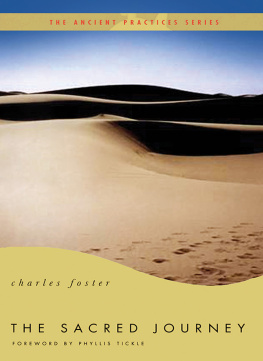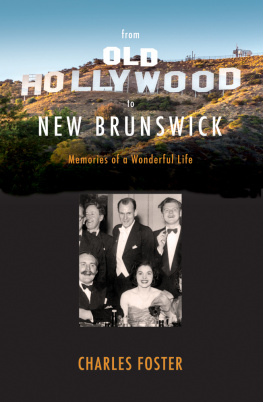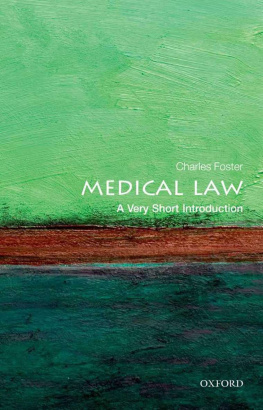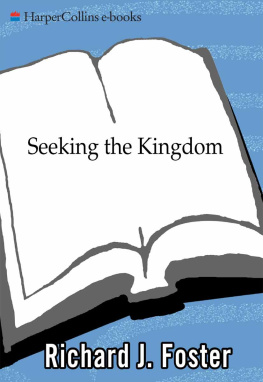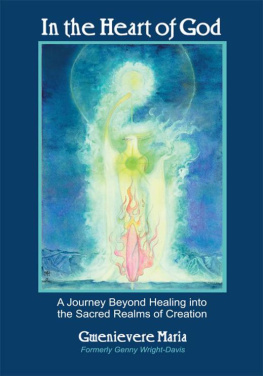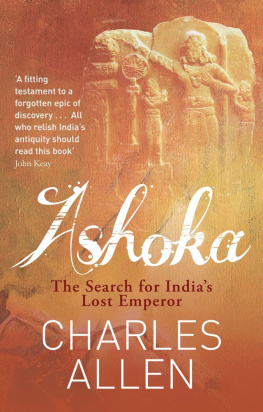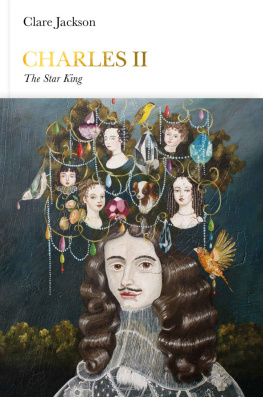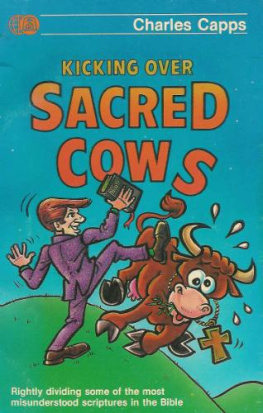[[ENDORSEMENTS: SAVE 2
LEAVES]]
THE SACRED JOURNEY
ALSO BY CHARLES FOSTER
The Selfless Gene: Living with God and Darwin
The Jesus Inquest: The Case Forand
Againstthe Resurrection of the Christ
Wired for God? The Biology of Spiritual Experience
Choosing Life, Choosing Death: The Tyranny
of Autonomy in Medical Ethics and Law
Tracking the Ark of the Covenant: By Camel, Foot,
and Ancient Ford in Search of Antiquitys Greatest Treasure
The Christmas Mystery: What on Earth Happened at Bethlehem?
www.charlesfoster.co.uk
THE SACRED JOURNEY
charles foster

2010 by Charles Foster
All rights reserved. No portion of this book may be reproduced, stored in a retrieval system, or transmitted in any form or by any meanselectronic, mechanical, photocopy, recording, scanning, or otherexcept for brief quotations in critical reviews or articles, without the prior written permission of the publisher.
Published in Nashville, Tennessee, by Thomas Nelson. Thomas Nelson is a trademark of Thomas Nelson, Inc.
Thomas Nelson, Inc., titles may be purchased in bulk for educational, business, fund-raising, or sales promotional use. For information, please e-mail SpecialMarkets@ThomasNelson.com.
Unless otherwise noted, Scripture quotations are taken from the NEW REVISED STANDARD VERSION BIBLE. 1989, Division of Christian Education of the National Council of the Churches of Christ in the United States of America.
Scripture quotations marked esv are from THE ENGLISH STANDARD VERSION. 2001 by The American Bible Society. Used by permission. All rights reserved.
Scripture quotations marked KJV are from the KING JAMES VERSION.
Scripture quotations marked NIV are from the HOLY BIBLE: NEW INTERNATIONAL VERSION , 1973, 1978, 1984 by International Bible Society. Used by permission of Zondervan Publishing House. All rights reserved.
Library of Congress Cataloging-in-Publication Data
[to include ISBN 10 and ISBN-13]
Printed in the United States of America
1 2 3 4 5 6 [ Printer Code ] 08 07 06 05
For David Monteath,
a great pilgrim who doesnt like to leave London
Go as a pilgrim and seek out danger...
JAMES ELROY FLECKER
Our interests on the dangerous edge of things...
ROBERT BROWNING, BISHOP BLOUGRAMS APOLOGY
CONTENTS
[[To Come from Phyllis Tickle. Save 4 leaves.]]
LOTS OF HUMANS WANDER. HISTORY IS CRISSCROSSED BY their tracks. Sometimes there are obvious reasons for wandering: to get better food for themselves or their animals; to escape weather, wars, or plague. But sometimes they do itat great expense and riskin the name of a supernatural being. This is very strange.
There are many books about pilgrimage: personal accounts, histories, sociological studies, and more or less structured anthologies of pilgrim tales and reflections. I have read quite a few of them. Many are superb. This book does not seek to compete with them. I am interested in three questions:
1. How did anyone ever think that a journey, such as a journey made by a barn swallow, had any religious significance?
2. Were they right?
3. If they were, what should we do with the insight?
I have tried to articulate a theology of pilgrimage. Some will be hurt and offended by it, and Im sorry about that. It goes roughly like this:
A. Travelling is fundamental to the definition and the psyche of human beings. We can suppress the desire to move, but if we do, nasty things happen to our heads, our societies, our souls, and our coronary arteries.
B. Since earliest times there has been a bitter battle between settlers and nomads, portrayed, of course, in the story of Cain and Abel. Historically, Cain seems to have gotten the upper hand.
C. In the Judaeo-Christian tradition, Yahweh is loudly and unequivocally on the side of the nomads. He was a pilgrim God, travelling in a box slung over the shoulders of refugees and worshipped in a tent.
D. Yahwehs preference for the nomads is understandable. Yahweh, whenever and in whatever guise he appeared, was a traveler. There are things about the nomads life that embody Yahwehs values and character: life on the edges; indiscriminate and costly hospitality; solidarity with the marginalized (most of the nomads time is spent outside main centers and in the company of peripheral people); intimate relationships with humans and the environment; a new view at every step; the loosest possible hold on possessions. And although many nomadic societies are hierarchical, theres an inevitable democracy among travelers. When everyone walks, no ones a king and everyones a king. But lets not get too romantic about the margin-people. They still need salvation. Theyre just likely to find it easier to grasp than center-people do. Its notoriously hard for poor little rich boys to enter the kingdom of heaven.
E. When Yahweh became a man, he was a homeless vagrant. He walked through Palestine proclaiming that a mysterious kingdom had arrived. That was and is the gospel. He called people to follow him, and that meant walking. The kingdom that sprung up around his dusty feet was weird: it was a place in which the first were last and the last were first. This Yahweh-man, partly because he was an itinerant tramp and partly because thats the way the kingdom always works, fascinated particularly the people on the edge of things: the underdogs, the despised. He wasnt a big hit with the urban establishment.
F. Being Christian (a word too contaminated by millennia of hypocrisy, violence, and downright error to be safe), meansfollowing the Yahweh-man, and expanding the topsy-turvy kingdom movement (significant word, that).
G. Pilgrimage is wandering after God. That it may be to a definite destination doesnt mean that its not wandering and doesnt destroy its continuity with the beloved nomads and the kingdom-preaching wanderings of Jesus.
H. There is a potent and important connection between the necessary, self-imposed marginalization of the pilgrim and Jesus own bias towards the edge-people. Christian pilgrimage can and should be a walk with Jesus. And that is necessarily a walk in kingdom territory, under those upside-down kingdom rules. The pilgrim road is a physical peninsula of the kingdom. As the kingdom sprung up around the sandals of Jesus, so kingdom flowers can spring up around pilgrim boots. Not necessarily, of course, but it often happens.
I. Edges are exciting places. It is there that different things collide and, therefore, that new syntheses happen. Just think about Portuguese cookery. To mix pork and clams and make savory cakes is insane, but the world would be much poorer if it had not happened. And it could only happen on the wild edge of a sober continent.
J. Physical pilgrimage involves bodies, blisters, hunger, and diarrhea. And its a kingdom activity. It is accordingly one of the best prophylactics against, and cures for, one of the most deadly and prevalent diseases crippling the church: gnosticism. It is also effective against bigotry, self-righteousness, and angst.
K. Pilgrimage is a journey back. It can give us new eyesthe eyes of children. And thats just as well, because only those who come as children can enter that strange kingdom. Childrens eyes see color and significance where we see only grays and emptiness. Pilgrims are dancing, delighting children. In the curious spiritual geometry of the kingdom, you can only go forward by going back.
Next page
